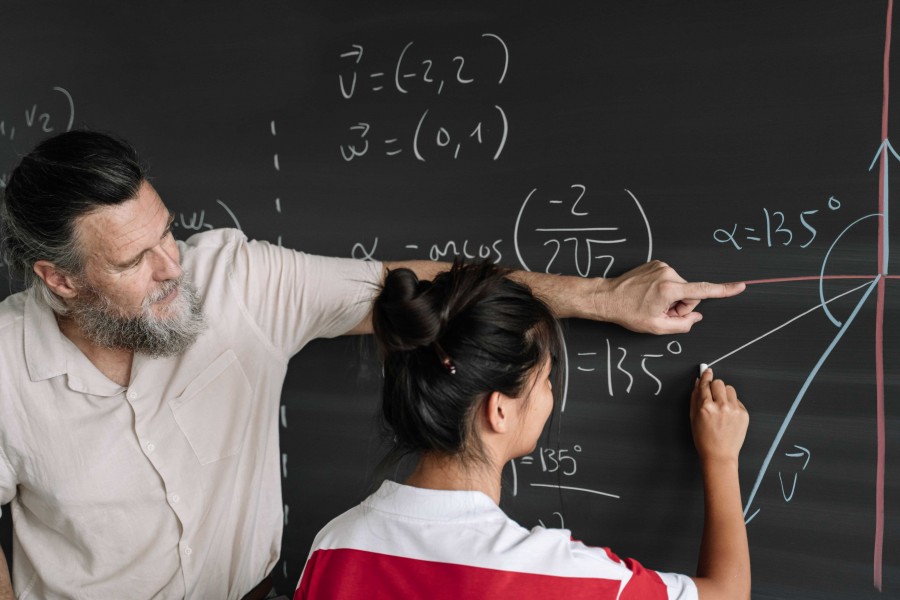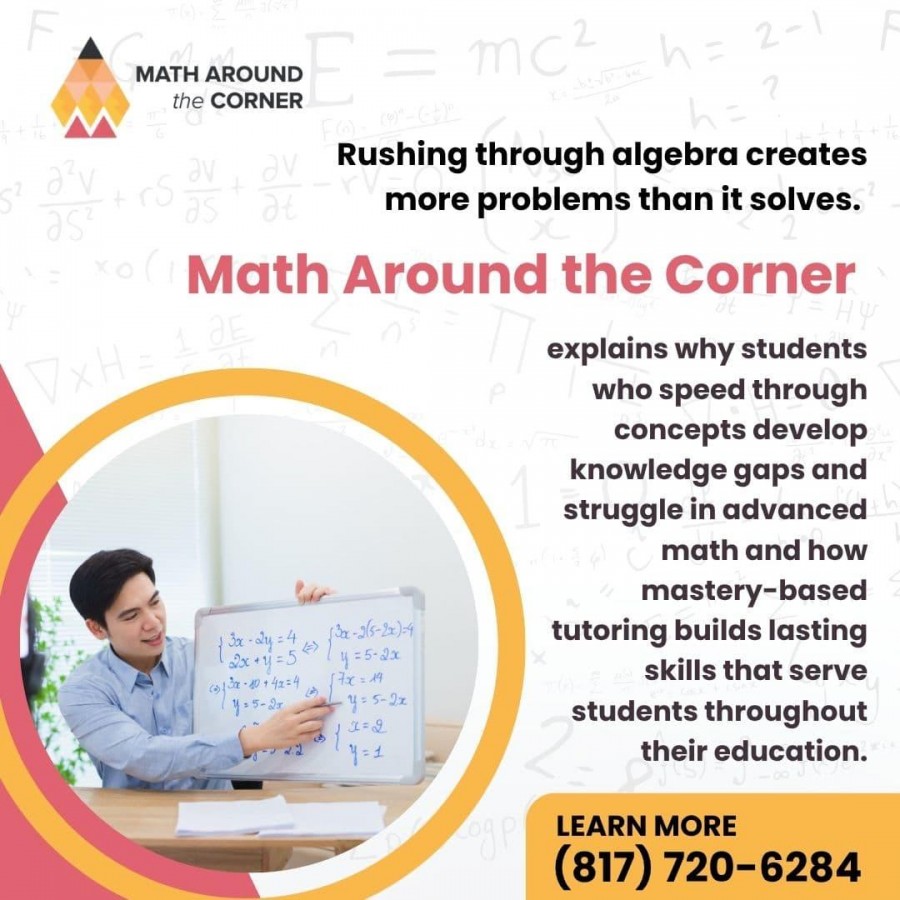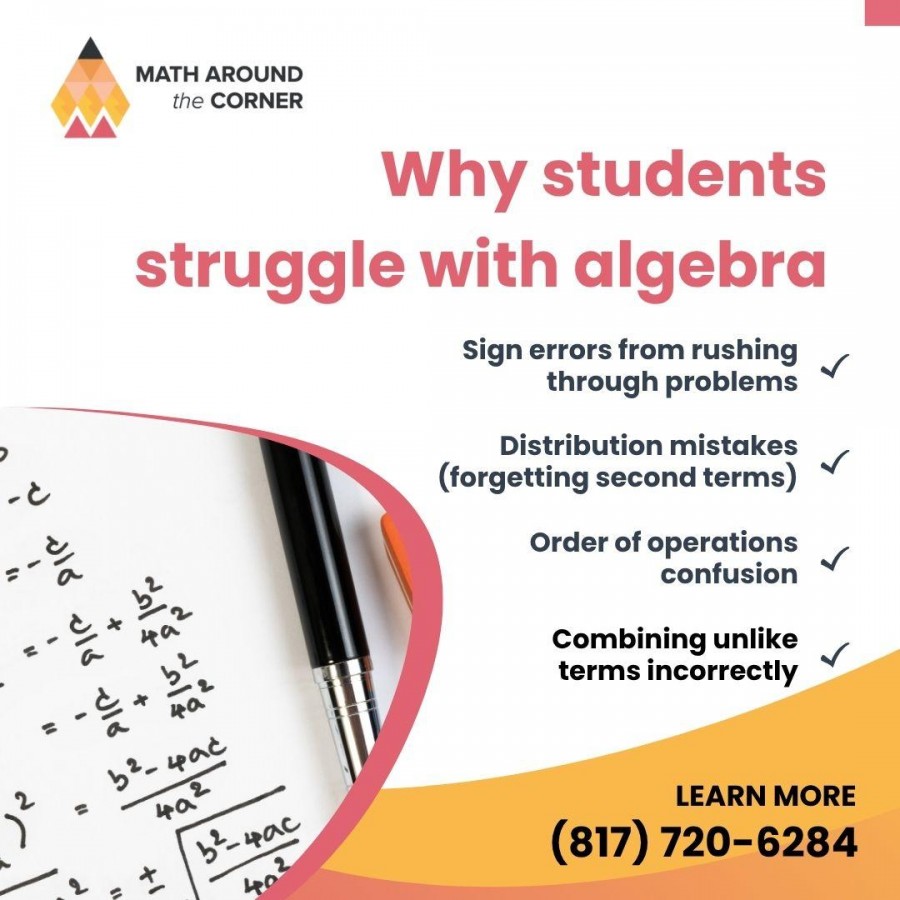The Algebra Learning Curve: Why Rushing Through Tutoring Algebra Backfires

Rushing through algebra creates more problems than it solves. Students who try to speed through algebra concepts often develop knowledge gaps, make repeated mistakes, and struggle with more advanced math later. Quality algebra tutoring focuses on building understanding step by step, not racing to finish material. At Math Around the Corner in Fort Worth, we've seen students achieve lasting success when they take the time to master each concept before moving forward.
Key Takeaways
- Rushing creates knowledge gaps that compound over time and make advanced math very difficult
- Common math mistakes stem from incomplete understanding and a lack of practice time
- Quality over speed produces better long-term results and builds lasting confidence
- One-on-one tutoring allows students to learn at their optimal pace without pressure to rush
Mastery-based learning, where students fully understand concepts before advancing, prevents future struggles

Why Do Students Rush Through Algebra?
The pressure to keep up with the classroom pace drives many students to rush. Parents want results quickly. Students see friends moving ahead and feel behind. School curricula move fast, leaving little time for deep understanding. However, this rush creates a cycle where students memorize procedures without grasping why they work.
When you rush through tutoring algebra, you miss the foundation. Algebra builds on itself. Each concept connects to the next. Skip understanding variables, and you'll struggle with equations. Rush through solving equations, and quadratic functions become impossible. According to UNESCO data, globally, only 44% of students reach minimum proficiency in mathematics at the end of primary school. This learning crisis often starts when students move too fast through foundational concepts.
Many students think learning algebra fast means racing through topics. It doesn't. True speed in algebra comes from a solid understanding. When students grasp core concepts deeply, they solve problems faster and make fewer mistakes. They don't need to relearn material constantly.
What Are the Most Common Math Mistakes in Algebra?
Understanding common math mistakes helps students avoid them. These errors appear again and again in algebra tutoring sessions:
Sign Errors: Students drop negative signs or place them incorrectly. This changes entire equations. A simple -3x becomes 3x, making every following step wrong. Sign errors happen most when students rush through problems without checking their work.
Distribution Mistakes: Multiplying 3(x + 2) should give 3x + 6. Many students write 3x + 2 instead. They distribute to the first term but forget the second. This error compounds when working with larger expressions or when negative signs are involved.
Order of Operations Confusion: PEMDAS exists for a reason. Students who skip this order get wrong answers every time. They might add before multiplying, or they handle exponents after multiplication. These mistakes seem small, but derail entire solutions.
Combining Unlike Terms: Students try to add x + 5 and get something impossible. Variables represent unknown values. You cannot add a number to a variable unless they match perfectly. Yet students rushing through algebra try to combine anything in sight.
Zero Product Rule Misuse: This rule states that if ab = 0, then either a = 0 or b = 0. Students sometimes apply this rule to other situations where it doesn't work. They might think that if ab = 5, then a = 5 or b = 5. Understanding when rules apply takes time; time that many students don’t invest.
How Does Rushing Through Algebra Tutoring Backfire?
Knowledge Gaps Accumulate
Each rushed topic leaves a small gap. Over time, these gaps add up. Students find themselves unable to solve problems that require earlier concepts. They forget why certain procedures work. When tests come, they struggle because they memorized steps without understanding principles.
At Math Around the Corner, we work with students who come to us after rushing through algebra elsewhere. They can follow procedures but cannot explain their reasoning. Ask them why they moved a term across the equals sign, and they don't know. They just "do it that way." This surface-level knowledge crumbles under pressure.
Confidence Drops
Students who rush make more mistakes. More mistakes mean lower grades. Lower grades destroy confidence. Soon, students believe they're "just bad at math." This belief becomes self-fulfilling. They stop trying because they think success is impossible.
Quality algebra tutoring rebuilds this confidence. When students take time to understand, they start solving problems correctly. Success breeds more success. They realize math makes sense when approached properly.
Advanced Math Becomes Impossible
Algebra 2, pre-calculus, calculus, and beyond all require solid Algebra 1 skills. Students who rushed through foundational algebra hit walls in advanced courses. They cannot factor polynomials quickly. They struggle with rational expressions. Logarithms make no sense because they never truly understood exponents.
According to research from industry experts, students who receive quality instruction with proper time allocation show statistically significant improvements in understanding. The study found positive effects on both teaching practices and student learning outcomes when teachers used inquiry-oriented lessons instead of rushing through the curriculum.
Bad Habits Form
Rushing teaches students to value speed over accuracy. They develop careless habits. They skip steps. They don't check work. These habits persist beyond algebra into all academic work and even professional life later.
Breaking these habits takes longer than forming good ones from the start. Students must unlearn rushed approaches and relearn proper methods. This process frustrates everyone involved.
What Does Proper Algebra Tutoring Look Like?
Building Conceptual Understanding
Effective algebra tutoring explains the "why" behind every procedure. Why do we move terms across the equals sign? Because we're maintaining balance. Why do we factor? Because it reveals solutions more clearly. Understanding these reasons helps students apply concepts to new situations.
Our tutors at Math Around the Corner spend time on foundations. We don't move forward until students demonstrate real understanding. This approach might seem slower initially, but students progress faster overall because they grasp material deeply.
Practicing Until Mastery
Repetition builds skill. Not mindless repetition, but thoughtful practice with increasing difficulty. Students work problems, get feedback, correct mistakes, and try again. This cycle continues until they solve similar problems accurately and quickly.
Mastery means students can solve problems without hesitation. They recognize patterns. They know which approach to use. This fluency only comes through adequate practice, which rushing eliminates.
Learning From Mistakes
Mistakes teach valuable lessons when students take time to analyze them. What went wrong? Where did the error occur? How can we prevent it next time? These questions turn mistakes into learning opportunities.
We encourage students to keep error logs. Writing down mistakes and explanations cements learning. Students see patterns in their errors. They become aware of personal weak spots. This awareness prevents repeated mistakes.
Connecting Concepts
Algebra isn't an isolated topic. Variables connect to equations. Equations connect to functions. Functions connect to graphs. Good tutoring in algebra shows these connections. Students see how everything fits together.
When students understand connections, new material makes more sense. They predict what comes next. They transfer knowledge between topics. This interconnected understanding represents true algebra mastery.
Comparing Learning Approaches: Speed vs. Mastery

This comparison shows why rushing backfires. Students save a few months initially but lose years of mathematical competence. The extra time spent learning properly pays dividends throughout their entire academic career.
How Long Does It Take to Learn Algebra Properly?
There's no magic timeline. Each student learns at their own pace. Factors affecting learning speed include:
Prior math foundation
Learning style
Practice consistency
Quality of instruction
Student engagement
Most students need a full school year for Algebra 1 when learning properly. Trying to condense this timeline usually backfires. Summer crash courses might help students pass tests, but they rarely build lasting understanding.
One-on-one algebra tutoring accelerates learning compared to large classrooms. Individual attention means tutors address specific struggles immediately. Students don't wait for the whole class to catch up or get left behind when the class moves too fast.
At our Fort Worth tutoring center, we've seen students raise failing grades to As within a semester through consistent weekly sessions. The key? They didn't rush. They worked steadily through the material, mastering each concept before advancing.

The Math Around the Corner Approach to Algebra Success
Mastering algebra takes time, patience, and the right guidance. Students who rush through material set themselves up for frustration and failure. Those who invest in proper learning build skills that serve them throughout their education and beyond.
We've spent nearly 20 years helping Fort Worth students excel in math. Our approach focuses on deep understanding, not quick fixes. We pair each student with a tutor who matches their learning style. Our tutors come from area colleges like Texas Christian University and maintain a minimum 3.6 GPA.
Ninety-eight percent of Math Around the Corner students pass their courses with an A or B when they attend weekly sessions with their assigned tutor. This success rate comes from our commitment to proper pacing and thorough understanding.
Students in Fort Worth, Benbrook, Aledo, and throughout the DFW metroplex benefit from our personalized algebra tutoring. We offer both in-person and virtual sessions to fit your schedule. Whether your child needs help with Algebra I, Algebra II, or pre-algebra, our tutors provide the patient, thorough instruction that builds real mathematical competence.
Call (817) 720-6284 or email hello@matharoundthecorner.com to schedule your student's algebra tutoring session. Unlike nationwide tutoring chains, we're locally owned and operated with deep roots in Fort Worth. We know the schools, understand the curriculum, and care about each student's individual success.
Don't let your child fall into the trap of rushing through algebra. Give them the gift of time to truly understand. The difference shows not just in their grades, but in their confidence and their readiness for future math courses. Math Around the Corner offers algebra tutoring that helps students strengthen their understanding and develop lasting math skills.
Contact us today to learn how personalized, paced algebra tutoring can transform your child's math experience and academic future. Success in every subject starts with the right foundation, and we're here to help build it properly.
